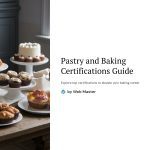 The world of baking and pastry arts is rich with opportunity, and obtaining a relevant certification can be a crucial step for professionals looking to enhance their skills and advance their careers. With numerous programs and certificates available, it can be difficult to choose the right one. In this article, we’ll compare various baking and pastry certifications, diving into their curriculum, prerequisites, and career impact, so you can make an informed decision about which certification suits your career goals.
The world of baking and pastry arts is rich with opportunity, and obtaining a relevant certification can be a crucial step for professionals looking to enhance their skills and advance their careers. With numerous programs and certificates available, it can be difficult to choose the right one. In this article, we’ll compare various baking and pastry certifications, diving into their curriculum, prerequisites, and career impact, so you can make an informed decision about which certification suits your career goals.

Key Considerations When Choosing a Certification Program
When selecting a baking or pastry certification, there are several important factors to consider. These include the program’s reputation, the level of expertise required, the certification’s global recognition, and its alignment with your career ambitions.
Reputation of the Certifying Body
It’s important to look for certifications issued by reputable organizations or institutions within the culinary industry. Institutions like the American Culinary Federation (ACF) and Le Cordon Bleu are known for their rigorous standards and international recognition. A certification from a renowned institution can provide credibility in the competitive world of baking and pastry arts.
Level of Specialization
Some certifications focus on general baking skills, while others offer a deep dive into specialized areas such as cake decoration, chocolate making, or artisan bread baking. Consider what area you want to specialize in, as certifications often cater to different aspects of the pastry industry.
Duration and Flexibility
The duration of certification programs can vary greatly, from a few months to a year or more. Some certifications require a significant amount of hands-on experience or apprenticeships, while others are more focused on theoretical learning. If you’re working while studying, it might be essential to look for flexible options.

Popular Baking and Pastry Certifications Explained
Let’s take a closer look at some of the most respected and well-known certifications in the baking and pastry field:
1. Certified Master Pastry Chef (CMPC)
The Certified Master Pastry Chef (CMPC) certification from the ACF is one of the highest honors a pastry chef can achieve. This certification is for experienced pastry chefs looking to validate their skills. The certification process involves a combination of practical and written exams, focusing on advanced techniques in areas such as chocolate, sugar work, and plated desserts.
Key Benefits:
- It is recognized globally and respected in the pastry arts community.
- It provides a competitive edge in high-end restaurants or pastry shops.
Prerequisites:
- Minimum of 10 years of professional experience in pastry.
- Completion of the ACF’s Certified Executive Pastry Chef (CEPC) certification is required before pursuing the CMPC.
2. Le Cordon Bleu Diplôme de Pâtisserie
Le Cordon Bleu is one of the most prestigious culinary schools in the world, and their Diplôme de Pâtisserie is highly sought after. The program is available globally and offers a well-rounded education in French pastry techniques, including classic desserts, artisan breads, and modern techniques. The program includes both theory and practical instruction.
Key Benefits:
- Internationally recognized, perfect for those seeking work in luxury establishments.
- Offers a comprehensive education that covers a broad range of pastry skills.
Prerequisites:
- No formal prerequisites, but students should have a passion for pastry arts and a desire to work in a fast-paced environment.
3. American Culinary Federation (ACF) Pastry Certification
The ACF offers several certifications for pastry chefs, ranging from beginner to advanced levels. The Certified Pastry Culinarian (CPC) is an entry-level certification, while the Certified Executive Pastry Chef (CEPC) is a more advanced credential. These certifications focus on everything from baking fundamentals to advanced pastry techniques and kitchen management skills.
Key Benefits:
- Offers a step-by-step certification progression from entry-level to executive level.
- Recognized by employers across the United States.
Prerequisites:
- The CPC requires a minimum of two years of experience in the industry, while the CEPC requires more advanced qualifications.

Comparing Global Certifications
Although there are numerous pastry certifications, not all of them are equally recognized across the globe. Here’s a comparison of three of the most internationally respected programs.
Global Reach of Certifications
- Le Cordon Bleu: Known for its international reputation, Le Cordon Bleu certifications are recognized in culinary establishments worldwide, especially in Europe and North America.
- ACF Certifications: While they are highly respected within the United States, ACF credentials may not carry as much weight internationally as those from institutions like Le Cordon Bleu.
- CMPC: The CMPC is highly regarded in North America and Europe, especially in high-end hotels, restaurants, and pastry shops.
Cost and Investment
- Le Cordon Bleu Diplôme de Pâtisserie: While prestigious, the cost of attending Le Cordon Bleu is significant, ranging from $20,000 to $50,000, depending on the location and program length.
- ACF Certifications: These certifications are generally more affordable, with costs ranging from $400 to $3,000, depending on the level and whether you’re a member of the ACF.
- CMPC: The cost of the CMPC certification can also be high due to the required experience and the in-depth exams, though the exact fees can vary.

Career Impact and Opportunities After Certification
So, how do these certifications translate into career opportunities? A certification can improve your chances of landing a job in a prestigious restaurant, hotel, or bakery.
Increased Earning Potential
Certified pastry chefs often earn higher salaries than non-certified professionals. According to industry reports, certified pastry chefs can make anywhere from $40,000 to $80,000 annually, depending on experience and location. At higher levels of certification, such as the CMPC or Diplôme de Pâtisserie, salaries can exceed $100,000.
Opportunities for Advancement
Having a certification can open the door to higher-level positions, such as pastry chef, executive pastry chef, or bakery manager. It can also make it easier to transition into teaching or consulting roles within the pastry industry.

Conclusion: Which Certification is Right for You?
Choosing the right pastry or baking certification depends on your career goals, budget, and location. If you’re looking for broad, internationally recognized training, Le Cordon Bleu may be the best fit. For those interested in a more affordable, step-by-step progression, ACF certifications offer a practical path. And for those with years of experience aiming for the highest level of recognition, the CMPC could be the pinnacle of your career.

Q&A: Frequently Asked Questions About Baking and Pastry Certifications
What’s the best pastry certification for beginners?
For beginners, the ACF’s Certified Pastry Culinarian (CPC) is a good option. It’s a practical starting point that provides foundational skills needed in the industry.
Can I pursue a pastry certification online?
Yes, many programs offer online pastry courses, though you may still need to complete hands-on training for certification. Some institutions, like the ACF, offer online learning for the theory portion of the certification.
How long does it take to earn a pastry certification?
This depends on the program. Entry-level certifications like the ACF CPC can be completed in as little as 6 months to a year, while programs like Le Cordon Bleu’s Diplôme de Pâtisserie take around 9 to 12 months of full-time study.
7imz_ Wrapping Up
Whether you’re just starting in the pastry world or are looking to take your career to the next level, obtaining a certification can be a game-changer. By understanding the benefits, prerequisites, and potential career outcomes of different certifications, you can make an informed decision on the best program for your future.
*Capturing unauthorized images is prohibited*




